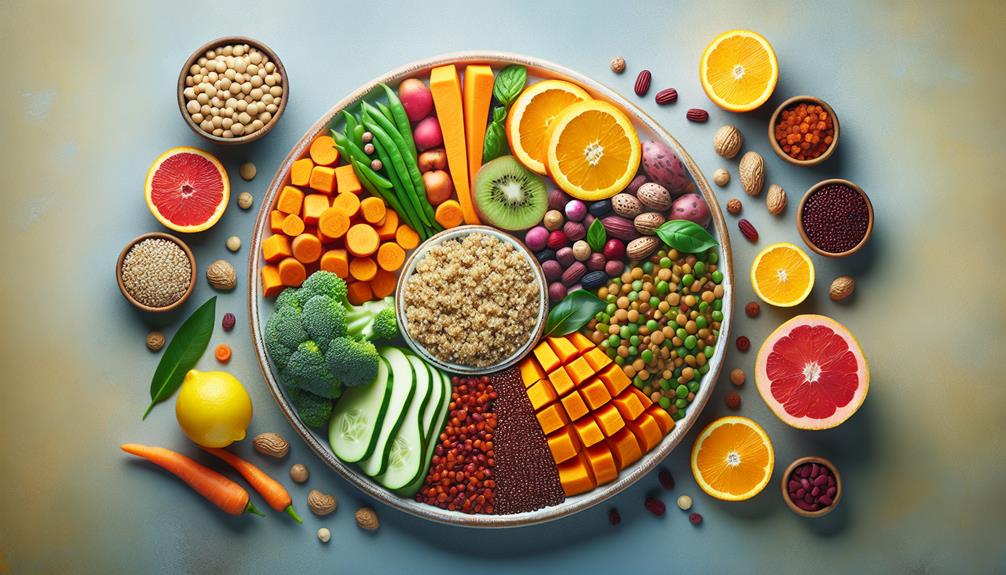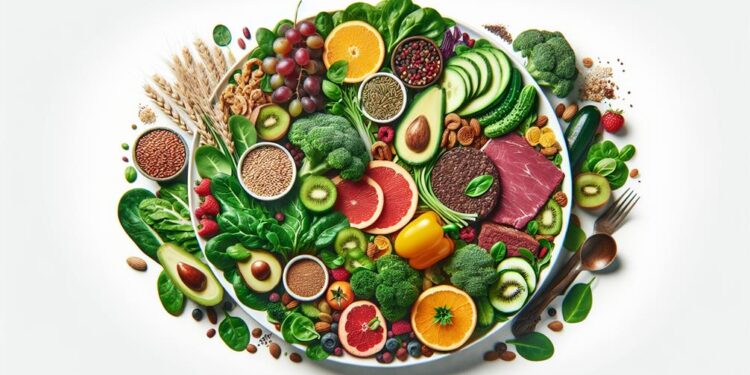Do you ever find yourself feeling sluggish and low on energy after a meal? Perhaps you've experienced the mid-afternoon slump that leaves you reaching for another cup of coffee. If so, it may be time to take a closer look at the composition of your meals. Achieving a well-rounded plate that provides the necessary nutrients for sustained energy and optimal health is easier than you might think. In this discussion, we will explore practical nutrition tips that will help you create balanced meals that leave you feeling energized and satisfied.
Key Takeaways
- Including a variety of macronutrients, such as whole grains, fruits and vegetables, and lean proteins, is essential for a balanced plate and overall nutrition.
- Incorporating colorful vegetables into meals provides a wide range of essential nutrients and phytochemicals with health benefits.
- Lean protein sources, including plant-based options, play a vital role in maintaining a nutritious diet, and cooking methods like grilling or baking can reduce added fats and calories.
- Choosing healthy fats, such as avocados, nuts and seeds, and olive oil, is important for overall health and can help with weight management. Smart carbohydrate choices, like whole grains and legumes, provide sustained energy throughout the day when consumed in moderation.
Essential Macronutrients for a Balanced Plate
To create a well-balanced plate, it is essential to include a variety of macronutrients that provide the necessary fuel and building blocks for your body's functions. When it comes to carbohydrates, it's important to choose the right sources and pay attention to portion sizes.
Carbohydrates are one of the main sources of energy for your body. They can be found in foods like grains, fruits, vegetables, and legumes. When selecting carbohydrate sources, opt for whole grains like brown rice, quinoa, and whole wheat bread, as they are higher in fiber and contain more vitamins and minerals compared to refined grains. Additionally, fruits and vegetables are excellent sources of carbohydrates that also provide important vitamins and antioxidants.
While carbohydrates are an important part of a balanced plate, portion control is key. It's easy to overconsume carbohydrates, especially when it comes to starchy foods like pasta, bread, and potatoes. Aim to fill about a quarter of your plate with a serving of carbohydrates, which is roughly the size of your fist. This will help ensure that you're getting enough energy without overdoing it.
Incorporating Colorful Vegetables for Optimal Nutrition
Incorporate a vibrant array of colorful vegetables into your meals to optimize your nutrition and enhance your overall health. Eating a variety of vegetables is not only visually appealing, but it also provides a wide range of essential nutrients that are beneficial for your body. By incorporating different colors of vegetables, you can ensure that you are getting a diverse mix of vitamins, minerals, and antioxidants that support your immune system, promote healthy digestion, and reduce the risk of chronic diseases.
Here are some creative vegetable recipes that you can try to incorporate more color into your meals:
| Red Vegetables | Yellow/Orange Vegetables |
|---|---|
| Tomatoes | Bell Peppers |
| Red Bell Peppers | Carrots |
| Beets | Sweet Potatoes |
| Radishes | Butternut Squash |
| Green Vegetables | Purple/Blue Vegetables |
| Spinach | Eggplant |
| Broccoli | Purple Cabbage |
| Zucchini | Purple Potatoes |
| Green Beans | Blueberries |
By including a variety of colors in your meals, you can reap the benefits of eating a rainbow of vegetables. Different colors indicate different phytochemicals, which are natural compounds that have been shown to have numerous health benefits. For example, red vegetables like tomatoes and bell peppers contain lycopene, which has been linked to a reduced risk of heart disease and certain types of cancer. Orange vegetables like carrots and sweet potatoes are rich in beta-carotene, which is converted into vitamin A in the body and supports eye health. Green vegetables like spinach and broccoli are packed with chlorophyll, which has antioxidant and anti-inflammatory properties.
Incorporating colorful vegetables into your meals not only adds visual appeal but also boosts your overall nutrition. By trying out different vegetable recipes and including a variety of colors on your plate, you can ensure that you are getting a wide range of essential nutrients that support your overall health and well-being. So, go ahead and embrace the rainbow of vegetables for optimal nutrition!
The Importance of Lean Protein Sources

Lean protein sources play a vital role in maintaining a well-rounded and nutritious diet. Incorporating these protein sources into your meals offers numerous benefits for your overall health. One option to consider is plant-based proteins, which have been shown to lower the risk of chronic diseases such as heart disease and type 2 diabetes. Plant-based proteins, like beans, lentils, and tofu, are also packed with fiber, vitamins, and minerals. They are not only nutritious but also environmentally friendly, as they require fewer resources to produce compared to animal-based proteins.
When it comes to cooking lean proteins, there are a few tips to keep in mind. First, opt for grilling, baking, or broiling instead of frying to reduce added fats and calories. Secondly, marinate your lean proteins before cooking to enhance the flavors and tenderize the meat, making it more enjoyable to eat. Additionally, be mindful of portion sizes to ensure you are getting the right amount of protein without going overboard. Lastly, try adding lean proteins to salads, stir-fries, or wraps for a satisfying and nutritious meal.
Choosing Healthy Fats for a Well-Rounded Meal
When it comes to creating a well-rounded meal, choosing healthy fats is an essential component for maintaining optimal nutrition and overall health. Incorporating healthy fat sources into your diet offers numerous benefits that contribute to your well-being. Healthy fats, such as monounsaturated and polyunsaturated fats, are known to improve heart health, support brain function, and aid in nutrient absorption.
Including foods like avocados, nuts, seeds, and olive oil in your meals can provide you with the healthy fats your body needs. Avocados are rich in monounsaturated fats, which can help lower bad cholesterol levels and reduce the risk of heart disease. Nuts and seeds, such as almonds, walnuts, chia seeds, and flaxseeds, are excellent sources of omega-3 fatty acids, which have anti-inflammatory properties and promote brain health. Olive oil, a staple in Mediterranean cuisine, is packed with monounsaturated fats and antioxidants that can help protect against chronic diseases.
Incorporating healthy fats into your meals not only adds flavor and texture but also helps you feel satisfied and full for longer. They slow down the digestion process, preventing blood sugar spikes and crashes, which can be beneficial for weight management. Remember to consume healthy fats in moderation, as they still contain calories. Aim to include a variety of healthy fat sources in your diet to reap the many benefits they offer.
Smart Carbohydrate Choices for Sustained Energy

To sustain your energy levels throughout the day, making smart carbohydrate choices is crucial. Carbohydrates are the body's main source of energy, and selecting the right ones can help provide long-lasting fuel. When it comes to carbohydrate timing, it's important to distribute your intake evenly throughout the day, rather than consuming large amounts all at once. This helps maintain steady blood sugar levels and prevents energy crashes.
Consider the following smart carbohydrate choices for sustained energy:
- Whole grains: Opt for whole wheat bread, brown rice, quinoa, or oats. These complex carbohydrates are rich in fiber, which slows down digestion and provides a steady release of energy.
- Legumes: Beans, lentils, and chickpeas are excellent sources of carbohydrates that also offer a good amount of protein and fiber. They help stabilize blood sugar levels and provide sustained energy.
- Fruits and vegetables: These are nutrient-dense sources of carbohydrates that also provide essential vitamins, minerals, and antioxidants. Choose a variety of colorful options to maximize your nutrient intake.
- Low glycemic index foods: Select carbohydrates that have a low glycemic index (GI) and load (GL). These foods are digested and absorbed more slowly, preventing spikes in blood sugar levels and providing sustained energy.
Frequently Asked Questions
How Can I Incorporate More Variety Into My Meals to Ensure I'm Getting All the Essential Macronutrients?
To ensure you're getting all essential macronutrients, incorporate variety into your meals. This is important for a balanced diet. Include a mix of protein, carbohydrates, and healthy fats from different sources like lean meats, whole grains, fruits, and vegetables.
Are There Any Specific Vegetables That Are Particularly Beneficial for Optimal Nutrition?
"The top vegetable choices for optimal nutrition include leafy greens, cruciferous vegetables, and colorful options like peppers and carrots. Get creative by adding them to salads, stir-fries, or even smoothies for a well-rounded meal."
Can You Provide Some Examples of Lean Protein Sources That Are Suitable for Vegetarians or Vegans?
You can find a variety of vegetarian protein sources that are suitable for vegans as well. Examples include tofu, lentils, quinoa, and chickpeas. These options provide essential nutrients and can be incorporated into well-rounded meals.
What Are Some Healthy Fat Alternatives I Can Use When Cooking or Preparing Meals?
When cooking or preparing meals, there are plenty of healthy fat alternatives you can use. Try swapping out butter for avocado or olive oil, and use Greek yogurt instead of sour cream.
How Can I Choose Carbohydrates That Provide Sustained Energy Throughout the Day?
To choose carbohydrates that provide sustained energy throughout the day, incorporate variety for essential macronutrients. Opt for whole grains, fruits, and vegetables. These options release energy slowly, keeping you fueled and focused.
Conclusion
In conclusion, creating well-rounded meals is essential for optimal nutrition. Did you know that according to a study published in the Journal of the American College of Cardiology, a balanced diet can reduce the risk of heart disease by up to 80%? By incorporating colorful vegetables, lean proteins, healthy fats, and smart carbohydrates, you can not only improve your overall health but also protect your heart. So let's make balanced plates a priority for a healthier future!













